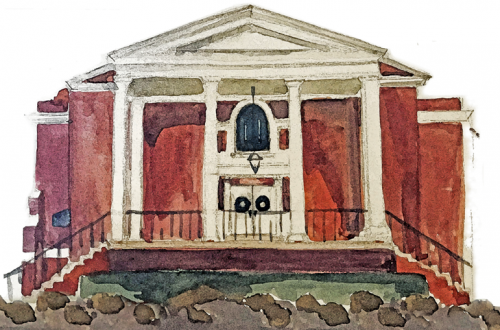 The redefinition of legal marriage in our culture will not end with same sex “marriage.” The polygamists are waiting in the wings for the opportunity to make their case—a case that will be all the more compelling as arguments for gay “marriage” take hold across the country. If marriage becomes defined as legal recognition of whoever it is that you love, on what basis will the polygamists be excluded?
The redefinition of legal marriage in our culture will not end with same sex “marriage.” The polygamists are waiting in the wings for the opportunity to make their case—a case that will be all the more compelling as arguments for gay “marriage” take hold across the country. If marriage becomes defined as legal recognition of whoever it is that you love, on what basis will the polygamists be excluded?
But redefinition won’t end with polygamous marriage either. The polyamorists are beginning to make their case as well. In an article for Slate magazine, Jillian Keenan argues that polyamorous unions should be on an equal footing with all other marriages. The polyamorous “family” featured in the article includes two men and two women, all of whom share one another sexually. Their relationship is defined as “consensual, ethical, and responsible non-monogamy.”
What does all of this have to do with legal marriage? According to the article,
Despite the stereotype of polyamorists as sexual anarchists who wouldn’t be interested in legal marriage anyway… 65 percent of poly families would choose to legalize their unions if they could, and an additional 20 percent would at least consider the option if it were available.
Keenan goes on to argue that children can flourish just as easily in polyamorous families as they can in a traditional family. If that sounds outlandish to you, here she is on her own words:
Studies have found that diverse parenting environments, including polyamorous ones, aren’t necessarily better or worse for the children involved. In fact, children in some plural families can actually benefit from the increased resources, care, and flexibility that additional adults provide. From a global and historical perspective, the phenomenon of the two-parent nuclear family is relatively new, and not the only environment that can be healthy for children. The happiness and well-being of kids in all kinds of families (monogamous, polyamorous, heterosexual, homosexual, or single-parent) depend far more on things like stability, boundaries, support, and love—not on the private, responsibly conducted sex lives of the adults involved.
This article is just one more piece of evidence that the redefinition of marriage won’t end with legal gay “marriage.” The trajectory that we are on means that legal marriage may very well be defined out of existence. If all unions are privileged in law, then no unions are privileged. There is evidence that this is precisely what the sexual revolutionaries have wanted all along.
This article also shows that our public debate about the nature of marriage often excludes certain voices. To argue that polyamory is immoral is simply not allowed. One can make an appeal to equality or to “best outcomes for children,” but one can hardly make the case anymore for a public policy based on a moral norm (at least in the realm of sexual ethics). In this article, the moral goodness of polyamory is simply assumed. Those who would argue that monogamy and heterosexuality ought to be the norm are not even a part of the conversation.
This article also shows that many people in our culture take it as self-evident that sexual license must not only be tolerated but also enshrined and privileged in law as a social good. It is more an assumption based on libertarian notions of equality than it is an argument based on a moral premise.
The slippery slope gets slicker and steeper every day.




11 Comments
Scott Lencke
Denny –
We must remember the slippery slope is never a valid argument. It is somewhat “anecdotal”. We cannot argue that this one article is “evidence” – This article is just one more piece of evidence that the redefinition of marriage won’t end with legal gay “marriage.” It is a projection into the unknown.
But the way, I believe marriage as God designed it, is between a man and woman. I simply think we’ve got to work with stronger arguments.
Also, you state: This article also shows that our public debate about the nature of marriage often excludes certain voices. To argue that polyamory is immoral is simply not allowed. Those who would argue that monogamy and heterosexuality ought to be the norm are dismissed as puritanical and bigoted.
I think the problem is how this is normally argued, the tone and method, if you will. Will we sound like a Pat Robertson or Jerry Falwell? Or will we sound like a C.S. Lewis, Miroslav Volf, etc….?
There is a way to aptly, wisely, graciously and faithfully argue our points.
James Harold Thomas
One thing is for sure: there are plenty of examples of polygamy among God’s people throughout the years. The polygamists/monogamish-ists will jump on these to put disagreers on the defensive.
Also it makes me wonder about all those arguments that people made like “well if we can change the genders allowed in marriage, why not change the number of participants?”. Folks made these arguments to try and show an inconsistency, and it looks like they’ve backfired. The inconsistency has been (or will be) eliminated, but in the opposite way they hoped.
James Bradshaw
It is currently legally permissible for a guy to shack up with a dozen women. Despite that, I don’t see it happening much at all (if ever). I live in a relatively liberal area of the nation, yet no one within my circle lives in such a way, nor does anyone I know actually know of anyone either.
Who’s actually requesting legal polygamy? Generally, it’s Mormon fundamentalists who have made this an issue not of personal self-indulgence but of religious freedom.
So, we come back to the question of what limitations can be placed on the expression of religious freedom. Should it be treated like a blank check to do just about whatever one wishes and receive exemptions to any law that infringes on that free expression? If not, where is the law to draw the line?
Beyond that, I don’t think polygamy is primarily an issue of civil rights. Even if we deny a man the ability to have five wives, he still has the option of having *A* wife and companion of his choosing.
Ian Shaw
Proving out point once again Denny that those opposed to homosexual marriage or any other kind besides one man and one woman, give a standard for what marriage should be. The other side nashes teeth and claims broad legal precedents, but gives no standard of what it should be.
Brian MacArevey
I think that a good question is, “why should any union be privileged by law in the first place”? Perhaps the whole “marriage issue” would have been a non-issue had our country not privileged and granted special benefits to married people? Isn’t privileging marriage actually contrary to the teachings of Paul anyway, who says that marriage should not be honored more than singleness (just one example)?
Suzanne McCarthy
I live in Vancouver where we have a long history of dealing with these things. We were early in recognizing same sex marriages, and these people are normalized, living ordinary lives and are no longer a visible minority. They have blended in well with the rest of us.
Polygamy, however, has gone in the opposite direction. Laws which criminalize polygamy have been upheld and reinforced in the last coule of years. Polygamy is considered to be a coercive and abusive practice. Even if there were such a thing as an egalitarian polygamous marriage, which nobody really thinks is so, it would still be against the law. The main text on this is called “A Cruel Arithmetic.”
The reality is that hierarchical marriages are still legal but are perhaps next on the block. That is the real direction of the slippery slope. Wives should not be able to vow obedience according to our civil laws.
Pingback:
Suzanne McCarthy
I have been thinking about your opinion that same sex relationships are more likely to be adulterous. Here are a few couples I know. Two retired women who are out gardening together every day. Two men, one of whom has had only one physical relationship in his life. I don’t know details about the other one, but he is a Christian. Then there are two women who are caring for the mother of one of them who has Alzheimers.
Suzanne McCarthy
Let’s just burn a little candle for truth.
Pingback:
Pingback: